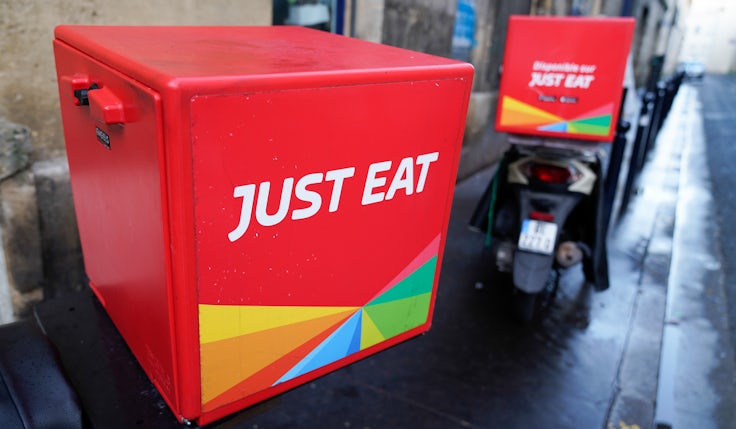Just Eat on ‘clear path to profitability’ after 85% rise in marketing spend
Just Eat’s loss after tax widened dramatically over 2021, from €151m (£126m) to a little over €1bn (£833m). However, the business says the significant investments it made over the pandemic have set it up to achieve profitability.
 Just Eat Takeaway.com believes it has paved the way towards improved profitability this year and beyond, having driven “strong growth” over the pandemic with substantially increased investment in its brand.
Just Eat Takeaway.com believes it has paved the way towards improved profitability this year and beyond, having driven “strong growth” over the pandemic with substantially increased investment in its brand.
The food delivery service increased global marketing spend by 85% over 2021, from €369m (£224m) in 2020 to €684m (£570m). This marks the second year the business has dramatically increased its marketing investment, having upped spend by 158% between 2019 and 2020.
On top of marketing, the company made significant investment over the year in “historically underinvested legacy markets” to “reposition” the business for online share gains, as well as expanding its delivery operations and restaurant network.
Following the successful launch of its employed courier model in London last year, the operation expanded into a further five UK cities in 2021.
As a result of these investments, revenue globally grew by 33% to €5.3bn (£4.4bn) in 2021, compared with €4bn (£3.3bn) in 2020. The business now has 99 million active customers, up 9% on 2020 levels, who each make on average 2.9 orders a month, up 11% on last year.
In the UK and Ireland alone, revenue grew by 63% year-on-year to €1.25bn (£1.04bn) in 2021 from €768m (£641m) in 2020. Order growth increased by 52% to 289 million, with Just Eat claiming it enjoys a “clear market leadership” position and is on a “clear path to profitability”.Just Eat drives UK growth after tripling marketing investment
Delivery orders in the UK and Ireland increased to 39% in 2021, from 15% in 2020. The gross transaction value (GTV) in the UK and Ireland increased 47% compared to 2020 to €6.65bn (£5.55bn).
However, the company also swung from a total adjusted profit of €363m (£303m) in 2020 to an adjusted loss of €350m (£292m). In the UK and Ireland, adjusted EBITDA fell from a profit of €237m (£197m) to a loss of €107m (£89m).
Net loss after tax widened dramatically from €151m (£126m) to a little over €1bn (£833m).
Nevertheless, Jitse Groen, CEO of Just Eat Takeaway.com, said the business is now “rapidly” progressing towards profitability following a period of “significant” investment.
Speaking on a call with investors today (2 March), chief financial officer Brent Wissink added: “2021 was an investment year, resulting in strong growth and a reinforcement of network effects.
“We made losses in the first half of the last year and will increasingly focus on profitability going forward. Our business has accelerated with growth drivers above pre-pandemic levels and we reiterate our 2022 and long-term guidance.”
Financial targets for 2022 include GTV growth in the mid-teens percentage points year-on-year and an improvement in adjusted EBITDA margin to the range of -0.6% to -0.8% of GTV.
Beyond 2022, the business plans to add in excess of €30bn (£25bn) of GTV over the next five years, with long-term group adjusted EBITDA margin in excess of 5% of GTV.
Considerably less investment spend can be expected next year, with Groen declaring marketing spend has “reached a ceiling” and is not expected to increase further.
Groen also pointed to better marketing efficiency as a lever to improve profitability moving forward, with plans to “leverage” last mile visibility, or the last stage of the supply chain before products reach the customer, to reduce marketing’s cost per order.
Just Eat’s most significant marketing activity over the last year includes partnering with UEFA for the Euro 2020 football tournament, which the business believes has positioned it as a “top-tier” sports sponsoring brand and laid the foundation for future work with UEFA through to 2025.Just Eat’s CMO: Remove yourself from the bubble – you are not the customer
Just Eat activated the partnership through a bespoke advertising campaign with some of the world’s biggest football stars, a “very successful” ‘Order and Win’ campaign, along with player escorts, fantasy football and other initiatives.
In alignment with its “strategic goals”, the brand claims to continue leading share of voice in most of its key markets, while steadily increasing top-of-mind brand awareness, resulting in new consumer acquisition growth over the last 12 months.
In August, Just Eat said it had grown its top-of-mind brand awareness in the UK to approximately 40%, although the market lagged behind others like Germany, where awareness reached nearly 70%.
Looking ahead, Groen today said Just Eat will be continuing to invest marketing spend behind the StampCard awards programme, which he described as a “huge benefit for consumers” within the business’s European operations.
In Germany, more than 30% of Just Eat’s restaurant partners are participating in the programme. Consumers get on average a 10% discount every time they order with the scheme, Groen said, which “creates loyalty” and is something its competitors don’t offer.
The business is also focused on furthering its partnerships with FMCG brands. Most recently, the business worked together with ice cream brand Magnum, advertising together to increase revenues for both Just Eat and the Unilever product.
“That’s also an additional source of quite some income for us,” Groen said. “We see huge potential going forward in that area.”





